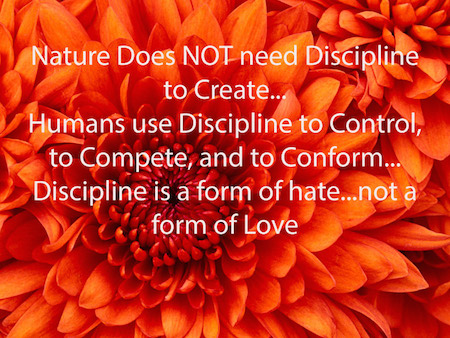I Got OWNED
Recently, I had the OWN (Oprah) channel on while doing some housework. The producers set up a help desk where people could ask questions of “spiritual” advisors. Three times, the experts recommended “discipline.” They said it was necessary for success. The first two times, I simply noticed that their comment felt bad and immediately let it go. But the third time, expert Carolyn Myss put me over the edge. I realized that I was looking in the face of a huge collective psychological reversal.
An overweight woman (by expert standards) asked Carolyn for help. Carolyn said, “Do you tend to gravitate toward pleasure?” The woman said, “Yes,” as she smiled. Carolyn responded critically, “That’s your problem. You have no discipline.” The woman looked like she wanted to slit her wrists or shit her pants. “Okay, now you pissed me off, Carolyn Myss,” I thought. I decided to really look at this word, discipline. My emotions were screaming, “False.”
Discipline
The “New Oxford American Dictionary” put things in perspective for me very quickly. Here’s what it said:
1) the practice of training people to obey rules or a code of behavior, using punishment to correct disobedience.
2) the controlled behavior resulting from discipline.
3) activity or experience that provides mental or physical training.
4) a system of rules of conduct.
Discipline is clearly unnatural; it involves training humans, like animals, to do what an authority or expert wants them to do. It’s key to a society based on good and evil, right and wrong, or win and lose.
Since the disciplinarians are already in the illusion, or they wouldn’t be using discipline, discipline is inflicted on those in powerless feminine roles, like children. Our minds record the voices of those who provide discipline until we acquire self-discipline, meaning we inflict reward and punishment on ourselves.
Oddly, the word discipline is very similar to disciple, another highly feminine role. Well, that made sense. Carolyn Myss is a recovering Catholic; her Catholicism often bleeds through in her books and teachings. The other two men who suggested discipline were M. Scott Peck, spiritual psychologist/author, and DeVon Franklin, Hollywood wanna-be preacher. Discipline and religion are clearly interconnected; both take us toward hell while claiming to take us to heaven.
The truth is that if we’re disciplining ourselves or others, we’re not good, we’re false. Discipline is following someone else’s rules that don’t feel good and don’t make sense to us. We should never have to do that in a sane world. If we’re obeying rules that don’t feel good and telling others to do the same, we’re clearly playing a false masculine role. We shouldn’t be leading anyone, not even ourselves.
In the TRUE masculine role, we do what we’re inspired to do. We provide a vision — not rules. The True Masculine has no desire to discipline others; there’s no need for it. You trust the people that you create with. Discipline isn’t even a word I’ve ever needed to have in my vocabulary.
When led by false masculine authorities, we have to muster up unnatural energy to do what they want us to do in the way they want it done. We become exhausted and depressed. We hate life. Then we discipline those below us (like our kids) because we’re starving for energy and life force.
Discipline or Abuse?
Just last week, someone posted on Facebook a comment about the lack of discipline in kids and how it’s because parents no longer spank. Of course, I couldn’t shut up because children were involved. So I wrote, “People will stop disciplining their children with physical punishment when they call it what it really is, child abuse.” You see, calling authoritarian bullying, unnecessary rules, enslavement, and physical punishment “discipline” makes the unacceptable acceptable.
Discipline produces slaves and obedient citizens, not successful or creative people. It’s a winning formula in the illusion. It has worked for thousands of years because we don’t stop and examine the reality or the real effects of discipline.
Pleasure
Carolyn Myss exposed the whole illusion around discipline when she said, “Do you tend to gravitate toward pleasure?” That’s when my emotions screamed, “Stop the madness. Your are Myss-taken.” She was saying, “If it’s pleasurable, it’s bad for you.” The idea that we’re supposed to be happy while we suffer is the Catholic mantra; it’s not true. We all naturally gravitate toward pleasure until we’re brainwashed to gravitate toward pain by following beliefs that generate emotions.
We’re all born to people who were already cooked to well done in the illusory oven before we arrived. If we could talk, we would have screamed, “Stop! That doesn’t feel right. I didn’t come to earth to see how well I could suffer.” Instead we got disciplined to become like our caretakers and authorities until eventually we couldn’t see the error in the illusion — it looked normal.
It’s not too late. We can let go of needing discipline right now. We can start to follow our inspiration at any time.
Carolyn Myss answered the woman’s question, but it’s doubtful that it helped. She gave her the cause of her weight problem. This woman thought she didn’t have enough discipline when she actually had too much. Her inner food police disciplines her constantly, piling guilt and shame on her food and reminding her that she’s not following the diet and exercise rules for a thin body. She believes the rich and successful (and disciplined) experts even though what they say feels horrible; her True Self knows the advice is false — it’s fixing the effect.
To get free, this woman needs to let go of trusting experts who keep telling her to be more disciplined so she can look the way they say she should look. She needs to stop dieting (which has the word die in it for a reason) and start living from her own True Self.
